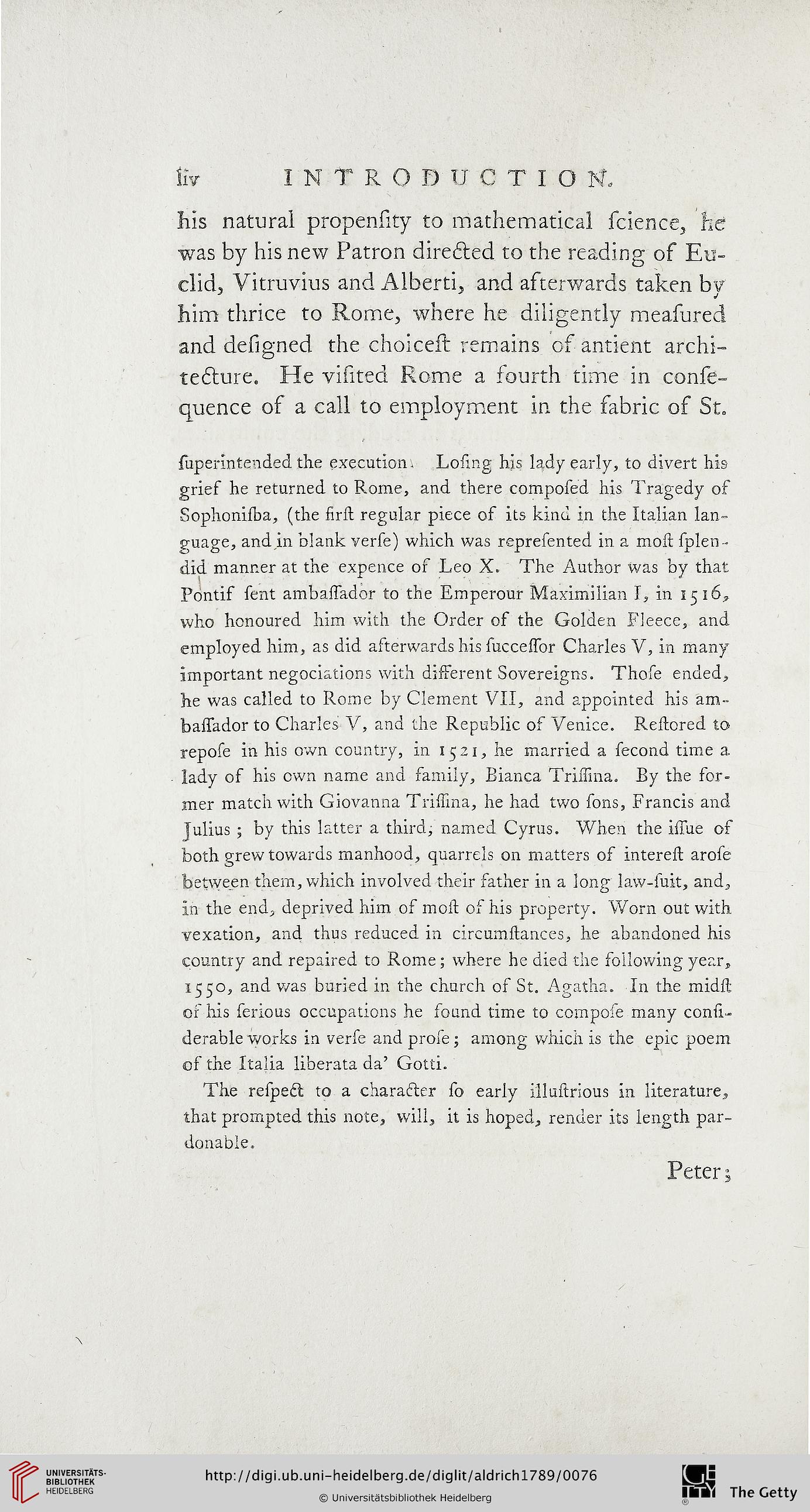INTRODUCTION,
liv
Ills natural propensity to mathematical saience, he
was by his new Patron directed to the reading of Eu-
clid, Vitruvius and Alberti, and afterwards taken by
him thrice to Rome, where he diligently measured
and designed the choice!! remains of antient archi-
tecture. He visited Rome a fourth time in conse-
quence of a call to employment in the sabric of St.
superintended the execution - Loiing his lady early, to divert his
grief he returned to Rome, and there compoled his Tragedy of
Sophonisba, (the first regular piece of its kind in the Italian lan-
guage, and in blank verse) which was represented in a most splen-
did manner at the expence os Leo X. The Author was by that
Pontif sent ambassador to the Emperour Maximilian I, in 1516,
who honoured him with the Order of the Golden Fleece, and
employed him, as did afterwards his successor Charles V, in many
important negociations with disserent Sovereigns. Those ended,
he was called to Rome by Clement VII, and appointed his am-
bassador to Charles V, and the Republic of Venice. Restored to
repose in his own country, in 15m, he married a second time a
lady of his own name and family, Bianca Trissina. By the for-
mer match with Giovanna Trissina, he had two sons, Francis and
Julius ; by this latter a third, named Cyrus. When the issue os
both grew towards manhood, quarrels on matters of interest arose
between them, which involved their father in a long law-iuit, and,
in the end, deprived him of most os his property. Worn out with
vexation, and thus reduced in circumstances, he abandoned his
country and repaired to Rome; where he died the following year,
1550, and was buried in the church of St. Agatha. In the midst
os his serious occupations he found time to compose many const-
derable works in verse and prose; among which is the epic poem
of the Italia liberata da’ Gotti.
The respeft to a charatfter so early illustnous in literature,
that prompted this note, will, it is hoped, render its length par-
donable.
Peter;
liv
Ills natural propensity to mathematical saience, he
was by his new Patron directed to the reading of Eu-
clid, Vitruvius and Alberti, and afterwards taken by
him thrice to Rome, where he diligently measured
and designed the choice!! remains of antient archi-
tecture. He visited Rome a fourth time in conse-
quence of a call to employment in the sabric of St.
superintended the execution - Loiing his lady early, to divert his
grief he returned to Rome, and there compoled his Tragedy of
Sophonisba, (the first regular piece of its kind in the Italian lan-
guage, and in blank verse) which was represented in a most splen-
did manner at the expence os Leo X. The Author was by that
Pontif sent ambassador to the Emperour Maximilian I, in 1516,
who honoured him with the Order of the Golden Fleece, and
employed him, as did afterwards his successor Charles V, in many
important negociations with disserent Sovereigns. Those ended,
he was called to Rome by Clement VII, and appointed his am-
bassador to Charles V, and the Republic of Venice. Restored to
repose in his own country, in 15m, he married a second time a
lady of his own name and family, Bianca Trissina. By the for-
mer match with Giovanna Trissina, he had two sons, Francis and
Julius ; by this latter a third, named Cyrus. When the issue os
both grew towards manhood, quarrels on matters of interest arose
between them, which involved their father in a long law-iuit, and,
in the end, deprived him of most os his property. Worn out with
vexation, and thus reduced in circumstances, he abandoned his
country and repaired to Rome; where he died the following year,
1550, and was buried in the church of St. Agatha. In the midst
os his serious occupations he found time to compose many const-
derable works in verse and prose; among which is the epic poem
of the Italia liberata da’ Gotti.
The respeft to a charatfter so early illustnous in literature,
that prompted this note, will, it is hoped, render its length par-
donable.
Peter;





